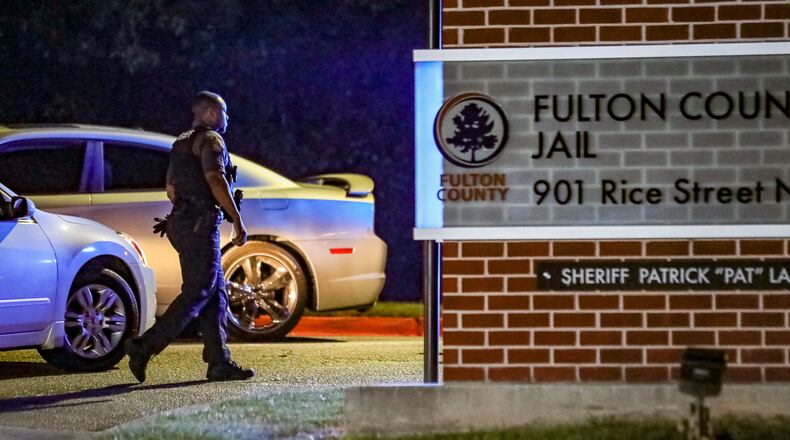Prosecutors, public defenders and other officials within Fulton County’s justice system — who often have opposing roles — are establishing a new framework to improve cooperation and efficiency, so cases move more quickly through the courts.
Participants in the nascent Criminal Justice Coordinating Council hope that streamlining Fulton’s justice system will relieve crowding in the county jail, where conditions are inhumane and unconstitutional, according to a Department of Justice investigation. The DOJ’s report, released last week, found that Fulton County and its sheriff’s office are violating the rights of inmates because of poor conditions and treatment at the facility.
However, a majority of Fulton County commissioners do not support committing staff or resources to the criminal justice council, according to commission Chairman Robb Pitts.
County Manager Dick Anderson has stopped attending meetings, according to commissioner Dana Barrett, who spearheaded creation of the justice council and is co-chair of its working group.
Barrett said the group has been meeting for about nine months and is in the process of adopting nationally recognized standards and bylaws. The council will be formally created Thursday, she said.
Active members of the working group include District Attorney Fani Willis, Public Defender Maurice Kenner, Sheriff Patrick Labat, Superior Court Chief Judge Ural Glanville and State Court Chief Judge Wes Tailor, among others.
Barrett noted that in recent years, the county justice system has made huge strides to reduce court backlogs that occurred during the pandemic, using funds from the American Rescue Plan Act to hire nearly 300 people to focus on that task. But she and others are concerned because that funding is drying up this year.
“There’s a lot of concern that the backlogs are going to continue to build up now because we’ve had to reduce that staff,” she said. “Wherever we can create efficiencies will be very helpful in trying to keep the system flowing.”
In an Aug. 6 letter Pitts sent to leaders of the justice council’s working group, the commission chair said Barrett’s participation should not be seen as “an official position” of the county commission.
“This is the first time most commissioners have heard of this effort,” Pitts wrote. “As such, the proposed council should not be viewed as having been approved by the BOC.”
Credit: arvin.temkar@ajc.com
Credit: arvin.temkar@ajc.com
Pitts’ deputy chief of staff said Tuesday that the letter “still captures his position and the position of the BOC.”
Barrett said Pitts’ letter is the reason Anderson stopped attending council meetings, believing it prohibited participation by him or his staff. Anderson could not be reached for comment.
“Having a high-functioning (council) requires involvement by county management and the Board of Commissioners,” Barrett said.
Barrett, a Democrat, said she plans to bring up the issue at Wednesday’s commission meeting so commissioners can “weigh in officially on working together with justice partners.”
“I’m not asking for any additional funds,” Barrett said. “I just want to get clarification. When they say no staff resources, what do they mean specifically, and can we move that roadblock out of the way for the county manager?”
In an interview last month, Labat said the number of people in his custody had been reduced by about 1,000 since he took office in 2021 — down from a high of about 3,700, when 600 inmates were sleeping on the floor at the Rice Street jail.
Councils exist elsewhere
Criminal justice coordinating councils exist in at least 22 states and Washington, D.C., according to a survey published in 2022 by the National Institute of Corrections. The concept of these councils emerged in the early 1970s, so court officials meet regularly and implement solutions to issues that bog down the system.
The National Institute of Corrections, part of the U.S. Department of Justice, and the Justice Management Institute, a nonprofit based in Virginia, helped Fulton County’s senior criminal justice officials form the council.
“The CJCC model is a model that’s working well in counties across the country,” Barrett said. “It’s a proven model to create high functioning justice systems that are more effective, more efficient, that operate better.”
Kenner, public defender for the Atlanta judicial circuit, supervises more than 100 attorneys, and his office has about 27,000 open cases in Fulton County courts. Public defenders represent clients in criminal cases who can’t afford a lawyer.
“I think working together is the way forward and our participation allows us to advocate for our clients in a collaborative, solution-focused context alongside our other judicial partners,” Kenner said.
“The whole purpose of the entire collaboration is to serve the public and our clients, to find ways to reduce the time spent in jail, to get folks into court as quickly as possible so they have their day in court,” Kenner added.
Ché Alexander, clerk of Fulton’s superior and magistrate courts, is co-chair of the justice council’s working group, along with Barrett. She said anything the council can do to improve the justice system’s efficiency could impact the number of people in the county jail.
“How long are the inmates standing there before they go to court? How long are they in there before they bond out? How long does it take for them to get processed in?” Alexander said in an interview Tuesday. “Everything that we could possibly touch in this council will have some impact on the jail.”
Credit: Michael Blackshire
Credit: Michael Blackshire
The August letter from Pitts was in response to an email Alexander sent to commissioners on July 29. In her message, Alexander expressed excitement and said she wanted to share information about the council’s work and ask for commissioners’ insight.
Pitts replied: “There have been multiple efforts over many years from councils, committees, task forces, etc. such as the one you have described in your communication. None of these endeavors have resulted in lasting change that improved the function or efficiency of our justice system, despite consuming a great deal of staff time and financial resources.”
He added that the board “has no objection to justice officials collaborating with each other and would hope that their work would yield improved outcomes in our justice system.”
In Tuesday’s interview, Alexander said she’s still hopeful that commissioners ultimately will support the justice council, especially after last week’s release of the DOJ investigation.
“With the jail report that just came in ... we’re just hoping they see how important it is,” she said.
About the Author
Keep Reading
The Latest
Featured



